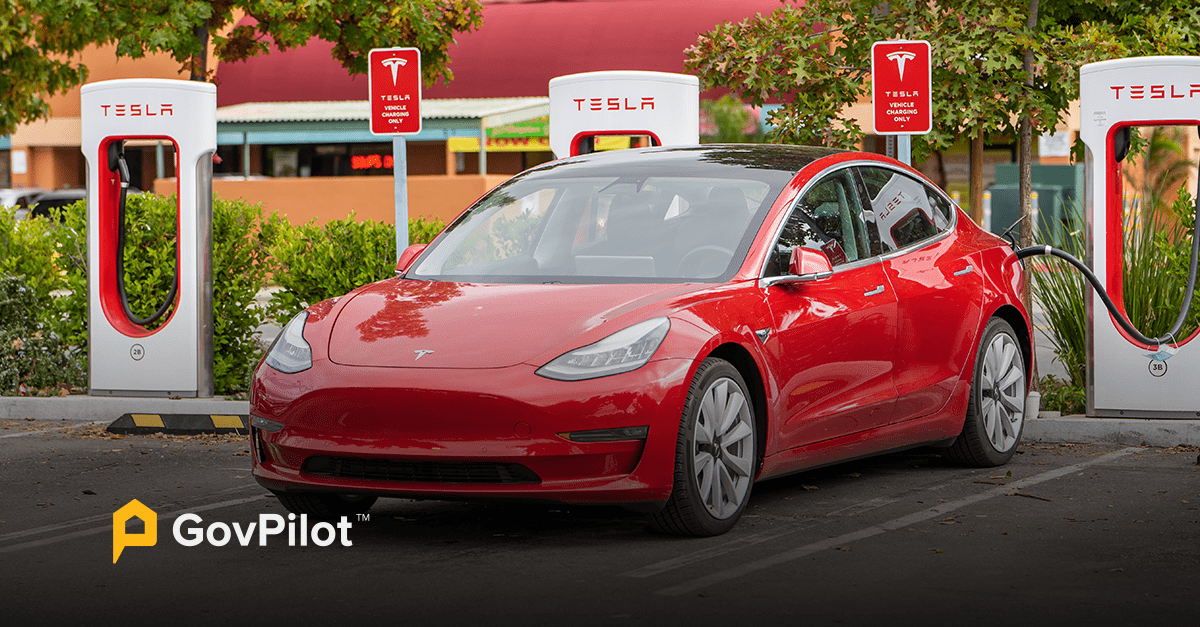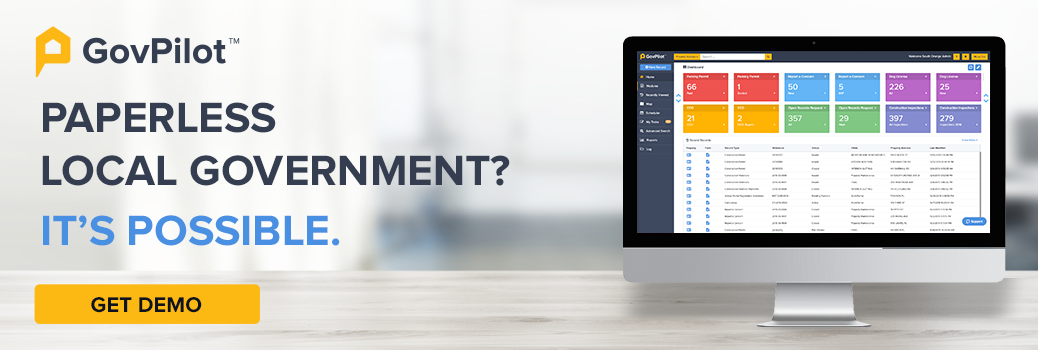Electric vehicles are being embraced worldwide, quickly gaining America's favor over traditional gas-fueled vehicles for many reasons, including increased demand for eco-friendliness and an infusion of Federal funding for EV infrastructure.
President Joe Biden signed the bipartisan infrastructure bill in November 2021, designating over $5 billion dollars in state-administered grants for deploying electric vehicle infrastructure across the nation. This bill supports local governments as they plan and build the necessary infrastructure for electric vehicles to operate on the roads.
For local governments, this means that you’re able to apply for Federal grants and funds that will allow you to modernize the transportation systems in your locality. To do so, you’ll need to create a local government electric vehicle strategy to equip your community with modernized EV infrastructure whether you are a newly elected government official, or you've been serving your community for years.
Read on for a deeper understanding of the grants dedicated to Electric Vehicle infrastructure, the best ways for local government officials to fund EV projects, and the critical infrastructure that needs to be considered.
Why Is The Need For Local Electric Vehicle Infrastructure Growing?
-
Influx of Americans buying electric vehicles:
The growing numbers of people who own electric vehicles expect local infrastructure for easily and efficiently charging their cars. It’s important that localities have conveniently located charging options for owners of EVs that support the constituents in their effort of sustainability.
-
Federal backing of electric vehicles:
The Federal government understands the wide-spread impact of Americans embracing electric vehicles. Federal policies are in place to encourage constituents to purchase electric, over traditional gas-fueled vehicles. Incentives such as the EV tax credit were enacted in order to incentivize constituents to make the switch, awarding up to a $7,500 dollar tax credit for owners of these EVs.
-
Environmental benefits:
There are extensive environmental benefits to driving electric vehicles over gasoline-fueled cars such as the fact that electric vehicles emit no harmful tailpipe emissions. When accounting for electricity emissions, research shows that an electric vehicle is responsible for lower levels of greenhouse gasses than an average new gasoline car.
How Can Local Governments Embrace Sustainability? Here’s what to know.
Federal Policies Focusing on Electric Vehicles
There are multiple federal grants available to support your local government’s EV efforts. Municipal, county, and state departments of transportation will be responsible for ensuring that funds are designated properly, and can be used to complete specific EV infrastructure projects.
Let’s take a look at the major EV policies for local governments:
1. Discretionary Grant Program for Charging and Fueling Infrastructure
The Discretionary Grant Program for Charging and Fueling Infrastructure is focused on deploying public electric vehicle charging infrastructure and other alternative fueling infrastructure along specific, alternative fuel corridors; this program focuses on rural and low-income neighborhoods. There is currently over one billion dollars in funding to be designated to eligible applicants. If your locality is chosen to receive a grant, a contract must be made with a private entity for acquisition and installation of publicly accessible EV charging infrastructure or approved fueling infrastructure.
- Eligible applicants: state, political subdivision of a state, metropolitan planning organization, local government, special purpose district, or public transportation authority.
- Apply to receive funds from the Discretionary Grant Program For Charging and Fueling Infrastructure through the U.S Department of Transportation.
2. Community Facilities Grant Program for Rural Development
Funds from the Community Facilities Grant Program for Rural Development can be used to purchase, construct, or improve any essential community facilities, as well as purchase equipment or pay for project expenses including all EV infrastructure. The funds will be given to rural areas including cities, villages, towns, and tribal lands; a population requirement exists to ensure funds are awarded to communities of 20,000 or fewer residents. The funding options available are low interest direct loans and grants.
- Eligible applicants: public bodies, community-based non-profit corporations, or federally recognized tribes for overall rural development.
- Apply for project funding through the Community Facilities Grant Program for Rural Development and check your eligibility to receive funds.
3. Rebuilding American Infrastructure with Sustainability and Equity Grant Program (RAISE)
The Rebuilding American Infrastructure with Sustainability and Equity (RAISE) discretionary grant program provides opportunities for departments of transportation to invest in projects that aim to achieve national objectives. If eligible for RAISE funds, project sponsors at the state and local levels obtain funding for multi-jurisdictional projects. This past year, the RAISE grant program increased program focus on zero-emission vehicle infrastructure, including EV charging accessibility.
- Eligible applicants: public entities, municipalities, counties, port authorities, tribal governments, MPOs, State DOTs and transit agencies.
- To apply for funding through the RAISE grant program, follow the instructions for completing a Project Information Form. Submit your final application through Grants.gov alongside all other application materials.
4. Other Available Federal Programs and Grants
Learn more about additional federal programs designed to improve EV infrastructure and transportation options.
- Federal Lands Access Program (FLAP)
- Congestion Mitigation and Air Quality Improvement Program (CMAQ)
- Low or No Emission Vehicle Program
Types of Electric Vehicle Infrastructure to Consider
When it comes to operating EVs smoothly in your community, you’ll need to have:
- Battery charging stations are implemented within the community to ensure that drivers can charge their vehicles through alternate-current charging, which should be the most available option.
- Rapid charging stations are placed throughout the community, operating with direct-current charging that powers vehicles much faster than alternate-current chargers.
- Battery exchange stations where electric vehicle owners can rapidly exchange their empty battery with a fully charged one, and should be introduced into communities that want to support EV drivers.
Building EV Infrastructure Through Private-Sector Partnerships
Creating contracts with private-sector partners is a necessity when building electrical vehicle infrastructure in your locality. These business partners can be trusted to expedite and complete projects that support EV, such as installing charging stations and battery exchange stations.
Research the best options of private companies to partner with when expanding electric vehicle infrastructure in your city. Chargepoint and Siemens are both private companies with notoriety for installing and operating vast networks of EV charging stations. These companies serve as great examples of what to look for when hiring private sector partners.
Be choosy about who you work with. Infrastructure projects fall behind schedule and go over budget far too often.
Tips For Streamlining Electric Vehicle Infrastructure Projects
Government technology can be used to ensure that the building of EV infrastructure in your locality goes as efficiently as possible. Here are various ways that government software can help:
1. Online Requests For Proposals (RFPs)
Building and construction software offers online forms, allowing contractors to bid on EV projects and submit detailed proposals directly via your government website. All applications will be stored in the cloud, allowing your local government offices to assess the competitive options available around price and timelines. Once you select a vendor, they’ll be notified online that they’ve been selected to build out your EV infrastructure.
2. Online permit/licensing approvals
Getting permits and licenses approved oftentimes is the cause of slow-moving infrastructure projects. Government software allows for permits and licenses to be submitted online, stored in the cloud, and approved or denied in just a few clicks from the computer to streamline the project and keep contractors on schedule.
Learn more about How Permitting Software Works.
3. Streamlined inspection workflows
To keep inspection workflows as efficient and cost-effective as possible, utilize mobile inspection software, which enables on-site inspections and real-time, cloud-based record keeping for better efficiency and organization.
How to Master Local Government Inspection Processes? Here’s what to know.
4. Streamlined EV infrastructure maintenance
Maintenance inspections are an important part of completing and maintaining electric vehicle infrastructure (and any local infrastructure project.) Public works software offers asset management tracking, meaning you can pre-schedule maintenance work and keep an eye on the status of locality-wide infrastructure.
5. Custom government dashboards
GovPilot’s government management software pulls real time data into intuitive and customizable dashboards for local government officials. Evaluate timelines, budgets, and other custom government metrics that you’ll need to oversee when developing local EV infrastructure, and track its usage, maintenance status, etc. upon completion.
Improve The Electric Vehicle Infrastructure In Your Locality
Localities should strive to improve their electric vehicle infrastructure quickly and efficiently with the help of federal grants and local government software. As transportation technology advances, it is important to modernize your community by developing important electric vehicle infrastructure. Constituents want more infrastructure to support the growth of the EV industry which are made possible by federal electric vehicle grants and local government software, designed to support your locality in expanding EV infrastructure.
To learn more about how GovPilot technology can help, book a free demo.
EV Infrastructure FAQs
What is electric vehicle infrastructure?
EV infrastructure is the organized structure that supports EVs operation on the road. The main aspects of successful EV infrastructure are ample charging, and new battery stations for drivers to charge their cars daily.
Why are electric vehicles appealing to so many Americans?
EVs are growing in popularity because they are better for the environment than gas-powered cars; EV’s don't release fossil fuels into the air. EV’s are convenient and usually require less maintenance than traditional-gas powered cars.
Why should local governments care about EVs?
Growing numbers of constituents are purchasing and using these vehicles which requires infrastructure to be built to support transportation systems in your locality. EV’s also have extensive environmental benefits compared to traditional gas-fueled cars.
Local governments also have a prime opportunity to take advantage of government infrastructure bill grants. In infrastructure grant funds for Texas alone, for example, the state received 408 million to expand electric vehicle charging stations.
Read On:
Sources:










